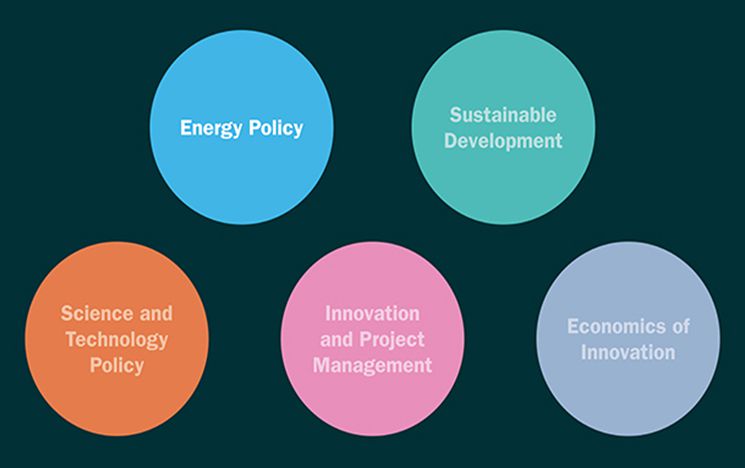Research by SPRU
Our research is driven by a desire to tackle real-world questions, whilst also contributing to a deeper theoretical understanding of how innovation is shaping today’s world.
Our themes of research
Our research is broadly clustered into these themes.
- Science, Politics and Decision Making
Populist politics have caused many individuals and organisations to rethink how best to construct the relationship between science, research and policy. At the same time, a range of pressures (including environmental challenges, an increasing health burden, failing urban infrastructure and the need for sustainable economic growth) make evident the necessity of developing science policy that delivers high-quality science and scientific advice. While traditional metrics for evaluating the quality of research are increasingly questioned, there is a clear need for new approaches. Ideally, these new approaches should support a notion of scientific excellence that is based on scientific integrity, is deeply embedded in efforts to address social and economic challenges and which fosters openness and creativity.
Our research, based on problem-solving and interdisciplinary approaches, crosses traditional disciplinary boundaries to contribute to an understanding of how that approach to scientific excellence can best be supported. Our blend of commissioned, grant-based and co-produced research enables us to look at issues from a range of perspectives and with a wide variety of stakeholders. Our work on Transformative Innovation Policy is one example of a creative way in which partnerships between researchers, research funders and policymakers can frame new approaches to Science Technology and Innovation policy.
SPRU is home to a number of research projects that are designed to evaluate knowledge production and facilitate better, evidence-based decision making. SPRU has active engagement with a number of research partnerships and networks working on these issues.
Researchers are also concerned with examining the nexus between science, innovation and industrial policy domains. Our research crosses policy environments in high, middle and low income / development country contexts.
A particular focus of our work is the governance and policy challenges surrounding chemical and biological weapons, including issues of dual-use technology. The Harvard Sussex Program, co-hosted at SPRU for over 25 years, uses technology as the lens through which to view issues of conflict and vulnerability, and understand forms of innovation that arise from the security landscape.
- Energy
SPRU is part of the Sussex Energy Group, uniting researchers across the University of Sussex and the Institute of Development Studies working on energy issues. The Sussex Energy Group is one of the largest independent social science energy policy research groups in the world.
The Sussex Energy Group aims to understand and foster transitions towards sustainable, low carbon energy systems. Drawing from SPRU’s tradition, we undertake academically rigorous, interdisciplinary and world-leading research that is relevant to contemporary policy challenges. We also educate the next generation of energy policy professionals through our MSc and PhD programmes.
Our research is clustered under six broad themes: energy innovation and transitions; economics and finance; energy justice; energy demand and behaviour; smart infrastructure; and energy supply technologies. Our projects are both problem-oriented and applied, engaging with a range of contemporary UK and international policy debates. We work with policymakers, industry and civil society across the globe in order to open up routes to an inclusive and sustainable energy future.
- Sustainable Development
As recognised in the international Sustainable Development Goals, no policy imperatives are more compelling or expansive than the need for global actions to end poverty and inequality. At the same time, these transformations must also build peace, meet growing needs for water, food and energy, and reverse devastating human impacts on the environment. There exists a diversity of ways in which these challenges can be met. But the complexities, uncertainties and political obstacles are formidable. For more than fifty years, SPRU has been at the heart of worldwide debate around these issues.
Throughout this complex field, science, technology – and knowledge and innovation of all kinds – are as fundamental to problems as to their solutions. SPRU research has played a leading role in highlighting how politics, diversity and process are as important as speed, efficiency and outcomes. Alongside creativity, rigour, productivity and expertise, there are essential roles for critique, openness, cooperation, accountability. Space for democratic struggle is as important around knowledge as around action, and this is crucial to the way SPRU works.
Across all its efforts around sustainability, SPRU draws from over 50 years’ experience of policy-engaged transdisciplinary enquiry and teaching. Our work aims to challenge and inform established practices in government, business and civil society. If the necessary transformative progress is to be achieved, deep changes are also necessary in many domestic lifestyles, as well as across wider public discourse and political cultures. SPRU’s aim is nothing less than to help the world realise diverse pathways to sustainability.
- Economics of Innovation and Industrial Policy
Modern capitalism faces great societal challenges. In an era of financial crisis and austerity coupled with serious global issues such as rising unemployment, climate change, poverty, it is critical to address the pressing challenge of reigniting and redirecting economic growth and driving the innovation needed for sustainable, inclusive growth.
Historically, the study of the Economics of Innovation has acted as a central pillar within SPRU’s diverse research portfolio, providing key theoretical and empirical tools for policy areas such as industrial policy, innovation policy and development policy.
SPRU’s current research focuses on advancing the economic theory of innovation, whilst also resetting the foundations of orthodox economics and advancing the fields of evolutionary and institutional economics. We seek to understand the structure and dynamics of innovating firms and industrial systems, how to enhance innovation capabilities of firms and other stakeholders in developed and developing countries, as well as how to steer structural changes towards sustainable growth.
Our research addresses policy-relevant issues including fostering inclusive growth and innovation, the feedback relationship between finance and innovation and mapping complex patterns in firm and market dynamics. Our key concern is to help strengthen innovation and industrial policies around the world. Our work is currently focused on four main areas: Industrial Policy, Economic Development and Growth, Firm Growth and Industrial Dynamics, and Financing Innovation and Financialisation.
SPRU has a group of academic researchers working on infrastructure issues. They use SPRU’s expertise in innovation and policy to understand the governance and development of critical infrastructure sectors and services, internationally and in the UK. Their research in infrastructure forms part of several flagship interdisciplinary collaborative projects.
- Technology and Innovation Management
High growth firms such as Google or Apple often create value and grow because they are innovative. Conversely, innovation is disrupting existing industrial structures across a range of sectors, private, public, manufacturing and services, requiring organisations to change their behaviour. Innovation, and the benefits it generates does not happen easily or automatically. It needs to be managed, which involves a set of skills and knowledge that are significantly different from the standard management toolkit.
In an increasingly competitive international environment, understanding how to effectively manage technology and innovation has become critical to success.
SPRU is a global leader in research and teaching in the area of innovation management. Our work focuses on enhancing innovation in all types of organisations, and across all sectors, and involves developing and delivering tools to improve the management of innovation within organisations and between organisations and their suppliers and customers.
Key areas of our work include: technology strategy, new technology-based firms and sectors, complex systems and products, high-growth new ventures, innovation in business model, infrastructure sectors, healthcare and biopharmaceuticals and services, and the management of knowledge and intellectual property.
One of SPRU’s strengths is our pervasive interest in the direction of technological change (not just its pace and impact), and understanding the varied pathways through which STI may develop and how that can be strategically managed.
Research Centres and Projects
Find out about our key Research Centres and Projects. We will also establish the Bennett Institute for Innovation and Policy Acceleration later this year.
Research Seminars
We hold regular research seminars featuring internal and external speakers. See our most recent seminars.


